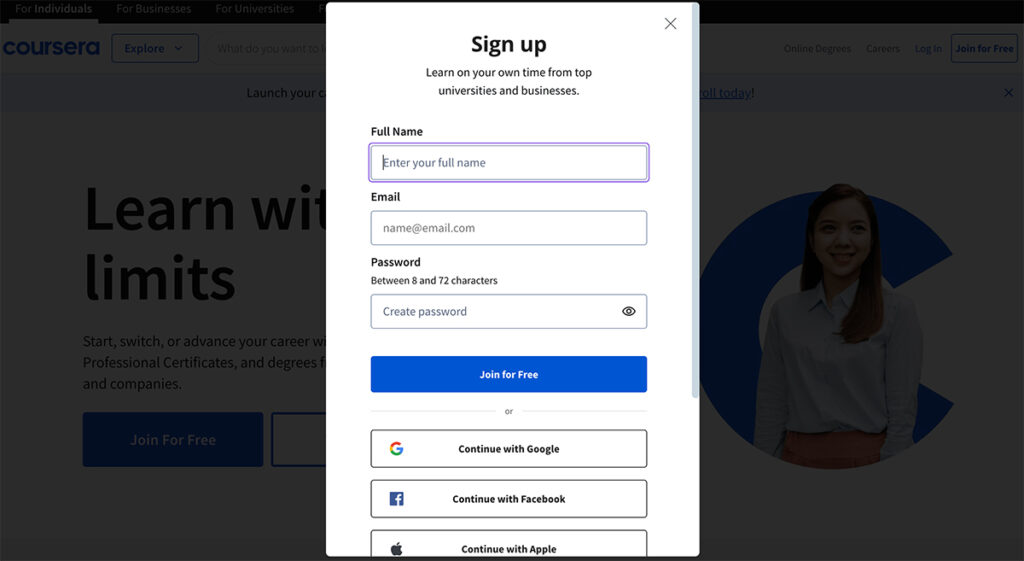Learning new skills or advancing your career has never been easier, thanks to online education. With just a few clicks, you can access high-quality courses from some of the best universities and industry leaders worldwide. Among the many platforms available, Coursera stands out as a trusted name in online learning. Whether you’re looking to gain a new certification, switch careers, or simply expand your knowledge, Coursera offers something for everyone.
In this guide, we’ll walk you through everything you need to know about Coursera—its features, benefits, pricing, course options, and how it stacks up against other online learning platforms. By the end, you’ll understand why millions of learners worldwide choose Coursera to achieve their educational and professional goals.
What is Coursera?
Coursera is an online learning platform founded in 2012 by Stanford professors Andrew Ng and Daphne Koller. It partners with over 275 leading universities and companies, including Stanford, Yale, Google, and IBM, to offer thousands of online courses, specializations, and degree programs.
Key Features of Coursera
- University Partnerships: Courses from prestigious institutions like Harvard, MIT, and Duke.
- Professional Certifications: Industry-recognized certifications from Google, IBM, and Meta.
- Affordable Learning Options: Free courses, paid certificates, and full degree programs.
- Flexible Learning: Learn at your own pace with video lectures and assignments.
- Hands-on Projects: Gain real-world experience with practical assignments.
Benefits of Using Coursera
1. Access to High-Quality Education
Coursera offers courses taught by professors from world-renowned universities, ensuring learners receive top-tier education without geographical limitations.
2. Career Advancement Opportunities
Many Coursera courses provide job-ready skills in high-demand fields such as data science, IT, business, and healthcare. Certifications can enhance your resume and increase employability.
3. Cost-Effective Learning
Compared to traditional education, Coursera offers affordable learning options. Many courses are free, and paid programs cost significantly less than university tuition fees.
4. Learn at Your Own Pace
With Coursera, you can take courses anytime, anywhere. This flexibility allows you to balance learning with work and personal commitments.
5. Networking Opportunities
Coursera’s discussion forums and peer-reviewed assignments enable interaction with fellow learners, creating opportunities for networking and collaboration.
Types of Courses Available on Coursera
1. Individual Courses
Coursera offers thousands of standalone courses in subjects like business, computer science, personal development, and more. These courses typically last 4-6 weeks and include video lectures, quizzes, and assignments.
2. Specializations
A specialization consists of multiple related courses designed to provide in-depth knowledge of a specific subject. For example, the Data Science Specialization by Johns Hopkins University is a popular choice for aspiring data scientists.
3. Professional Certificates
These programs, created by industry leaders like Google, IBM, and Meta, equip learners with job-ready skills in fields such as IT support, project management, and digital marketing.
4. MasterTrack Certificates
MasterTrack programs allow learners to complete a portion of a master’s degree online and earn credits that can be applied toward a full degree program.
5. Online Degrees
Coursera offers full bachelor’s and master’s degree programs from institutions like the University of London and the University of Illinois. These degrees are fully online and recognized globally.
Coursera Pricing Plans
1. Free Courses
Many courses on Coursera are free to audit, but they do not come with a certificate.
2. Coursera Plus
For $59 per month or $399 per year, Coursera Plus provides unlimited access to over 7,000 courses and certifications.
3. Paid Certifications
Courses that offer certificates typically range from $39 to $99 per course.
4. Degree Programs
Online degrees on Coursera can cost anywhere from $10,000 to $30,000, which is significantly lower than traditional university tuition fees.
How Coursera Compares to Other Online Learning Platforms
| Feature | Coursera | Udemy | edX | LinkedIn Learning |
|---|---|---|---|---|
| Course Quality | High (University-backed) | Varies | High (University-backed) | Moderate |
| Certificates | Industry-recognized | Certificate of completion | University-backed | LinkedIn badge |
| Price Range | Free – $30,000 | $10 – $200 | Free – $25,000 | $39.99/month |
| Degree Programs | Yes | No | Yes | No |
Coursera stands out for its high-quality university-backed courses and full degree programs, making it a preferred choice for those seeking accredited education.
Read: Udemy | Courses Available, Features, and How to Enroll
How to Enroll in a Coursera Course
- Create an Account – Sign up on Coursera’s website using your email or Google account.
- Browse Courses – Search for courses based on your interests or career goals.
- Choose a Learning Option – Select a free audit, paid certification, or enroll in a specialization.
- Start Learning – Watch video lectures, complete assignments, and participate in discussions.
- Earn a Certificate – Upon completion, receive a certificate to showcase on LinkedIn or your resume.

Tips for Maximizing Your Learning on Coursera
- Set Clear Goals – Define what you want to achieve from each course.
- Follow a Study Schedule – Allocate dedicated time for learning each week.
- Engage in Discussions – Participate in forums to enhance your understanding.
- Apply Your Knowledge – Work on real-world projects to reinforce learning.
- Showcase Your Achievements – Add certificates to your LinkedIn profile and resume.
Coursera is an excellent platform for learners who want to gain new skills, earn recognized certifications, or complete an online degree. With its diverse course offerings, flexible learning options, and partnerships with top universities and companies, Coursera continues to be a top choice for online education.
Whether you’re a student, a working professional, or someone looking to switch careers, Coursera provides the tools and resources needed to achieve your learning and career goals.
Read Also: Khan Academy: Features and Benefits | How to get started